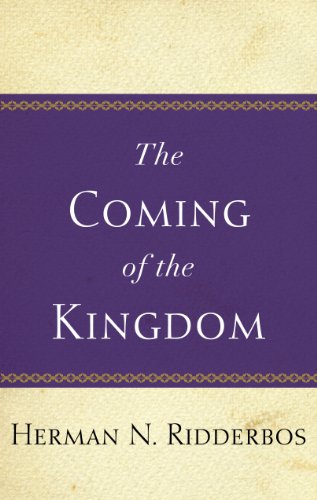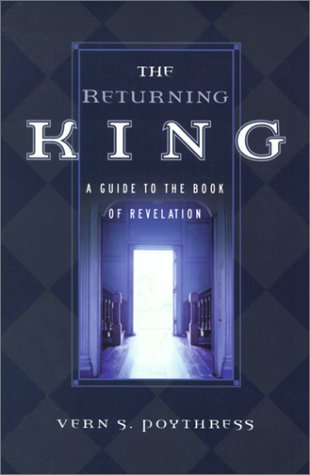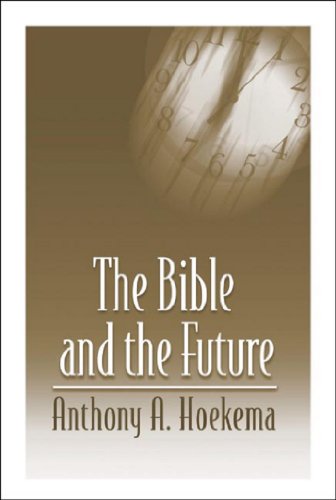Quotes about Eschatology-Second_Coming
Let us consider this settled: that no one who has made progress in the school of Christ who does not joyfully await the day of death and final resurrection… Let us not hesitate to await the Lord’s coming, not only with longing, but also with groaning and sighs, as the happiest thing of all. He will come to us as Redeemer.
All we could ever imagine, could ever hope for, He is… He is the Prince of Peace whose first coming has already transformed society but whose second coming will forever establish justice and righteousness. All this, and infinitely more, alive in an impoverished baby in a barn. That is what Christmas means – to find in a place where you would least expect to find anything you want, everything you could ever want.
In His coming the “last day”’ to which the Old Testament looked forward arrived, but they have not yet run their course; the Christian church is still living in this eschaton. Jesus’ first coming inaugurated it; His second coming will consummate it. The coming of Jesus was, therefore, the beginning of the end.
In my ministry I have noticed that when people are hurting, they frequently express their hope for Christ’s return – “Oh! I wish the Lord would return today!” But I have never heard anyone say, “Things are going so well…I wish Christ would return right now!”
Taken from James by Kent Hughes, copyright 1991, Crossway Books, a division of Good News Publishers, Wheaton Illinois 60187, p. 222, www.crosswaybooks.org.
Brothers and sisters, the coming of Christ is near. The ultimate epiphany is just around the corner. If we think otherwise, we tragically impoverish our souls. Most Christians think little of Christ’s return, or if they do think about the day they will see Christ, they associate it with the day of their death. This is a proper hope, but death is not a pleasant thing, and thus the expectation of seeing Christ is mixed with a certain fear of the dark veil. But it is not so with His Second Coming. It is all joy! And that singular joy is meant to be a boon to our souls.
Kent Hughes Taken from James by Kent Hughes, copyright 1991, Crossway Books, a division of Good News Publishers, Wheaton Illinois 60187, p. 225, www.crosswaybooks.org.
The great doctrine of the second advent has in a sense fallen into disrepute because of…this tendency on the part of some to be more interested in the how and the when of the second coming rather than in the fact of the second coming.
The Second Coming of Jesus Christ is a cardinal doctrine of the Christian faith. It is not minor, it is not unimportant, it is not secondary or tertiary, it is critical. It is a substantial reality in our faith. In fact, in some ways the Second Coming of Jesus Christ is the most important of events because it’s the end of the story, because the Second Coming consummates everything, everything. To minimize the Second Coming is to minimize everything else because this is the finale, the culmination. His return consummates the history of the world and the history of redemption and the fulfillment of all God’s pledges and promises and covenants and threats and warnings. All blessing and all judgment in its final disposition is connected with the coming of Jesus Christ. World history seems sometimes to be careening sort of helter-skelter, pell-mell into blackness, sort of uncontrolled. But that is not the case. While men’s behavior becomes less and less controlled, the very movement of history is under the sovereign control of God, who is moving it inexorably, exactly to the point which He has predetermined, and that is the return of Jesus Christ.
Reward and Punishment at Christ’s Return. The sermon originally appeared (https://www.gty.org/library/sermons-library/42-177/reward-and-punishment-at-christs-return) at www.gty.org. © 1969-2008. Grace to You. All rights reserved. Used by Permission.
Are we to think that the last view the world will ever have of Jesus is Him hanging on a cross, naked in shame?
Reward and Punishment at Christ’s Return. The sermon originally appeared (https://www.gty.org/library/sermons-library/42-177/reward-and-punishment-at-christs-return) at www.gty.org. © 1969-2008. Grace to You. All rights reserved. Used by Permission.
Why there must be a Second Coming: 1. Jesus must return because the promise of God demands it. 2. The claims of Christ Himself demand it. 3. The testimony of the Holy Spirit demands it. 4. The future of the church demands it. 5. The corruption of the world demands it. 6. Jesus must come because the covenant He made with Israel demands it. 7. The vindication of Christ Himself demands His return. 8. The judgment of Satan demands His coming. 9. The hope of believers demands it. 10 The groaning of the whole creation demands it.
Reward and Punishment at Christ’s Return. The sermon originally appeared (https://www.gty.org/library/sermons-library/42-177/reward-and-punishment-at-christs-return) at www.gty.org. © 1969-2008. Grace to You. All rights reserved. Used by Permission.
The apostolic church thought more about the Second Coming of Jesus Christ than about death and heaven. The early Christians were looking, not for a cleft in the ground called a grave but for a cleavage in the sky called Glory.
The second coming of Christ will also involve the reversal of the curse that was placed on creation at the time of the fall. The creation will no longer groan under the weight of the curse. It will be set free from its bondage to decay (Rom. 8:18–25). All things will be made new. There will be no more tears, no more death, no more mourning, no more pain, for all of these things will have passed away (Rev. 21:1–8). The enemy Satan will be defeated and judged, no more to accuse and attack the people of God (Rev. 20:7–10). All men will stand before the judgment throne of Christ. Those whose names are written in the Lamb’s Book of Life will inherit the kingdom. Those whose names are not found will be cast into outer darkness (20:11–15).
The Coming of the Kingdom, Tabletalk magazine, Used by Permission of Ligonier Ministries.
If one really wants to a see a theology for the church in action, one might walk into an old church graveyard at night. Walk about and see the headstones weathered and ground down by the elements. Contemplate the fact that beneath your feet are men and women who once had youthful skin and quick steps and hectic calendars but who are now piles of forgotten bones. Think about the fact that the scattered teeth in the earth below you once sang hymns of hope -maybe “When the Roll Is Called Up Yonder I’ll Be There” or “When We All Get to Heaven.” They are silent now. But while you are there, think about what every generation of Christians has held against the threat of sword and guillotine and chemical weaponry. This stillness will one day be interrupted by a shout from the eastern sky, a joyful call with a distinctly northern Galilean accent. And that’s when life really gets interesting.
Redemptive history remains incomplete until Christ returns. It is for the final act in the great drama of redemption that the church awaits with longing.
As surely as men standing in Jerusalem once saw Him slowly descending the Mount of Olives and then ascending the opposite hill into the city, so surely shall the world one day see the Son of Man descending the heavens. Not then shall He come as the meek and lowly: He shall come with power and great glory. Not then shall He come riding on an ass: He shall come in a cloud, the emblematic carriage of deity. Not then shall he have to borrow a donkey: then His advance preparations shall be the roaring of the sea and the shaking of the powers of the heavens (David Gooding).
The center of Christianity is the coming of the Son of God into the world as a real man to destroy the works of the devil and create a new people for His own glory. The very heart of our faith is that He did this by obeying the law of God, dying for the sins of His people, rising victorious over death, ascending to God’s right hand with all His enemies under his feet. The second coming of Christ is the completion of His saving work. If you take it away, the whole fabric of His saving work unravels.
Our Hope: The Appearing of Jesus Christ, May 18, 1986, www.DesiringGod.org, Used by Permission.
The immense step from the Babe at Bethlehem to the living, reigning triumphant Lord Jesus, returning to earth for his own people–that is the glorious truth proclaimed throughout Scripture. As the bells ring out the joys of Christmas, may we also be alert for the final trumpet that will announce his return, when we shall always be with him.
Jesus is not indifferent, unconcerned or unable to fulfill His promise. He knows after He returns there will be no opportunity for salvation. His so-called delay “as some count slowness” (2 Pet. 3:9) is a token of His mercy – giving people just a little more time to repent and trust Him. Jesus is being patient for His enemies to come to repentance. It was the same before His judgment with water. “When the patience of God kept waiting in the days of Noah” (1 Pet. 3:20). God is always looking to show mercy to the guilty (cf. Eze. 33:11).
There will be a dramatic end of the world and it will not be caused by human beings. As a matter of fact, they think too small. It will be the fullest of global warming. The fullest of an all-out nuclear war. Everything will be destroyed with intense fire (2 Pet. 3:7, 10, 12). And based on what we know, why is this so hard to fathom? After all, God made the sun and it sits at a toasty 10 thousand degrees Fahrenheit at the surface and 27 million degrees Fahrenheit at the core. I’d says God can easily create “intense heat (2 Pet. 3:10, 12).”
So, how can you “hasten the coming of the day of God (2 Pet. 3:12)?” Share your faith so the fullness of God’s people will come to salvation. Matthew 24:14, “This gospel of the kingdom shall be preached in the whole world as a testimony to all the nations, and then the end will come.” And pray – “Come [quickly], Lord Jesus” (Rev. 22:20) and “Your kingdom come” (Mat. 6:10).
Jesus will come bathed in radiant splendor, enveloped within an atmosphere of indescribable brilliance, surrounded by the ear-piercing praise of angels and saints. Scintillating light shining from His eyes. Irresistible power pouring from His hands. None will deny His beauty or escape its transforming energy.
One Thing, Christian Focus, © Enjoying God Ministries, 2004, p.187. www.enjoyinggodministries.com. Used by Permission.
More than a fourth of the Bible is predictive prophecy. Approximately one-third of it has yet to be fulfilled. Both the Old and New Testaments are full of promises about the return of Jesus Christ. Over 1,800 references appear in the Old Testament, and seventeen Old Testament books give prominence to this theme. Of the 260 chapters in the New Testament, there are more than 300 references to the Lord’s return – one out of every thirty verses. Twenty-three of the twenty-seven New Testament books refer to this great event. Three of the four other books are single-chapter letters written to individuals concerning a particular subject, and the fourth is Galatians, which does imply Christ’s coming again. For every prophecy on the first coming of Christ, there are eight on Christ’s second coming.
The Coming of the Prince of Peace is a promise that everything that is damaged by sin will be restored.
Between the two comings of Jesus, believers experience what is often called the tension between the already and the not yet. Jesus’ followers can look back and see that D-day, the decisive strike, has already occurred and now guarantees thorough defeat of the enemy. Nevertheless, the time after the first coming and before the second coming involves ongoing warfare with the spiritual forces of darkness and their terrestrial supporters. V-day has not yet arrived, and so the potential for setbacks and defeats still exists. All too often, God’s people succumb to temptation and score a victory for the enemies of God. Still, the decisive strike at the first coming of Jesus guarantees ultimate victory at the second, and Jesus’ followers fight the good fight with assurance that God who has begun a good work at the first coming of Jesus will bring it to completion at the second.
Biblical prophecy provides some of the greatest encouragement and hope available to us today. Just as the Old Testament is saturated with prophecies concerning Christ’s first advent, so both testaments are filled with references to the second coming of Christ. One scholar has estimated that there are 1,845 references to Christ’s second coming in the Old Testament, where 17 books give it prominence. In the 260 chapters of the New Testament, there are 318 references to the second advent of Christ – an amazing 1 out of every 30 verses. Twenty-three of the 27 New Testament books refer to this great event. For every prophecy in the Bible concerning Christ’s first advent, there are 8 which look forward to His second!




















